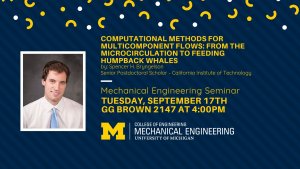Presented By: Mechanical Engineering
Mechanical Engineering Seminar Series
Computational Methods for Multi-Component Flows: From the Microcirculation to Feeding Humpback Whales

Part of the Mechanical Engineering Seminar Series
Spencer H. Bryngelson
Senior Postdoctoral Scholar
California Institute of Technology
Working with Tim Colonius
Tuesday, September 17, 2019
4:00 p.m.
2147 GG Brown
Abstract
Multi-component flows play a central role in engineering problems ranging from the design of biomedical devices for therapy to naval and aircraft development. I will consider cellular, cavitating, and droplet flows as canonical examples of such flows. Each case is treated using novel computational techniques for simulation. This includes a sub-grid disperse flow model that is based upon particle population moments and improved via recurrent neural networks. The high-fidelity spectral and discretely-conservative interface-capturing methods used to solve for the flow will be discussed, including a presentation of our new open-source solver, MFC, that implements them. These large-scale simulations are complemented by novel analyses based-upon non-modal stability theory, chaotic dynamical systems, and stochastic and data-driven techniques. These are interpreted as they apply to microfluidics, rheometry, and even feeding humpback whales.
Bio
Dr. Spencer Bryngelson is a Senior Postdoctoral Scholar at the California Institute of Technology, working with Professor Tim Colonius. Previously, he was a Postdoctoral Researcher at the Center for Exascale Simulation of Plasma-Coupled Combustion (XPACC), a PSAAP II center. He received his PhD and MS in Theoretical and Applied Mechanics from the University of Illinois at Urbana–Champaign in 2017 and 2015, respectively, working with Professor Jonathan Freund. In 2013, he obtained BS degrees in both Mechanical Engineering and Engineering Mathematics from the University of Michigan–Dearborn. His research lives at the intersection of fluid dynamics and computational physics, with a focus on biomedical, defense, and environmental applications. In pursuit of this, he develops high-performance software, physical models, numerical methods, and techniques for physics-based and data-driven analysis
Spencer H. Bryngelson
Senior Postdoctoral Scholar
California Institute of Technology
Working with Tim Colonius
Tuesday, September 17, 2019
4:00 p.m.
2147 GG Brown
Abstract
Multi-component flows play a central role in engineering problems ranging from the design of biomedical devices for therapy to naval and aircraft development. I will consider cellular, cavitating, and droplet flows as canonical examples of such flows. Each case is treated using novel computational techniques for simulation. This includes a sub-grid disperse flow model that is based upon particle population moments and improved via recurrent neural networks. The high-fidelity spectral and discretely-conservative interface-capturing methods used to solve for the flow will be discussed, including a presentation of our new open-source solver, MFC, that implements them. These large-scale simulations are complemented by novel analyses based-upon non-modal stability theory, chaotic dynamical systems, and stochastic and data-driven techniques. These are interpreted as they apply to microfluidics, rheometry, and even feeding humpback whales.
Bio
Dr. Spencer Bryngelson is a Senior Postdoctoral Scholar at the California Institute of Technology, working with Professor Tim Colonius. Previously, he was a Postdoctoral Researcher at the Center for Exascale Simulation of Plasma-Coupled Combustion (XPACC), a PSAAP II center. He received his PhD and MS in Theoretical and Applied Mechanics from the University of Illinois at Urbana–Champaign in 2017 and 2015, respectively, working with Professor Jonathan Freund. In 2013, he obtained BS degrees in both Mechanical Engineering and Engineering Mathematics from the University of Michigan–Dearborn. His research lives at the intersection of fluid dynamics and computational physics, with a focus on biomedical, defense, and environmental applications. In pursuit of this, he develops high-performance software, physical models, numerical methods, and techniques for physics-based and data-driven analysis